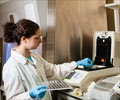80 percent of parents with at least one child with Autism Spectrum Disorder (ASD) would pursue genetic testing.

The findings were reported in "Parental Interest in a Genetic Risk Assessment Test for Autism Spectrum Disorders," a survey published online today in the journal Clinical Pediatrics. The survey of 162 parents of children with ASD also reported an almost three-year lag from the time ASD was initially suspected until a child received a diagnosis --even in families with a previously diagnosed child.
The internet-based survey was sponsored by IntegraGen, Inc. and conducted during February and March 2012. Earlier this year, the CDC announced that ASD prevalence in the United States has increased to one in 88 children, and even with increased awareness, the average age of ASD diagnosis is greater than four years. "The majority of parents surveyed said they would be interested in having their child tested if a genetic test was available that could identify ASD risk--even if it could not confirm a diagnosis—in order to facilitate an earlier diagnosis and access to therapies known to make a positive impact on their child's development," stated the study's primary investigator Elizabeth Couchon, M.S., L.G.C., a licensed genetic counselor and medical sciences liaison for IntegraGen, Inc., which recently launched the ARISk® Autism Risk Assessment Test.
This multi-SNP (Single Nucleotide Polymorphism), gender-specific genetic screening test looks at 65 genetic markers associated with ASD to assess the risk of autism in children under the age of 36 months who have an older sibling with ASD, paving the way for early diagnosis, early intervention and better outcomes "Our goal was to better understand parents' experiences with the ASD diagnostic process, assess their anxiety levels about the risk of ASD recurring in their family, and gauge attitudes regarding the use of a genetic risk assessment test to evaluate risk for ASD in younger siblings," she added. "The survey found that families experienced a significant delay in the time it took to get an ASD diagnosis when they realized something was wrong, even when they had an older child with ASD".
"Parents who have one child with ASD are often anxious about younger siblings since we know there is a genetic component and that ASD runs in families," says national autism expert Antonio Hardan, M.D., a member of IntegraGen's advisory board and one of the study's co-authors. "These parents often know the signs and symptoms of ASD, and typically recognize issues with their younger children's development.
Many also know earlier diagnosis and intervention leads to better outcomes, so the availability of an early screening tool that could aid with early diagnosis would relieve some of their anxiety." The average recurrence risk for siblings of children affected with ASD has been reported as 18.7%, a 20-fold increase compared to the prevalence of ASD in the general population, suggesting a strong genetic component to the cause of ASD. However, despite the increased risk to siblings, the earlier identification and diagnosis of those siblings at highest risk remains a challenge. The survey was limited to parents living in the United States with at least one child diagnosed with ASD. The survey also focused on parents who had both an older child with ASD and undiagnosed siblings under the age of 48 months.
Advertisement
- Although all responders suspected their child had a developmental delay by the time they were 21.4 months on average, it still took approximately three years from the time they suspected this delay until their child received an ASD diagnosis even when there was a previously affected child in the family.
- The average age when ASD was diagnosed reported by parents surveyed was 4.7 years (56.6 months) which is similar to the CDC reported average age of diagnosis for ASD of 4.4 years (53 months). Parents surveyed indicated a delay in ASD diagnosis was primarily due to either a "wait and see" approach by the child's pediatrician or a delay in seeing a specialist. Only 28% indicated that there was not a delay in diagnosis for their child.
- Of parents with a younger undiagnosed sibling under the age of 48 months, 80% indicated that they would be interested in having their child tested if a genetic test were available that could identify siblings at increased risk for ASD even if it could not confirm a diagnosis. When asked why they would be interested in such a test, all parents cited earlier evaluation to secure earlier access to intervention, and closer monitoring, with 85% of parents also indicating a lessening of anxiety.
Advertisement















